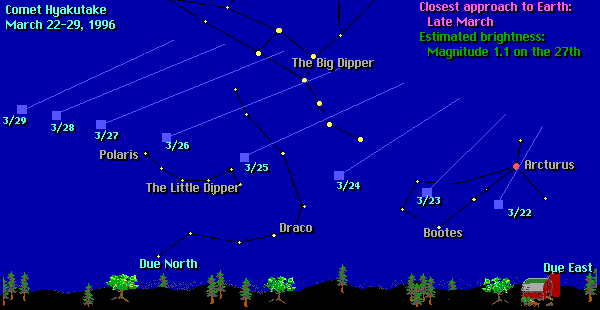Astronomy Picture of the Day
Discover the cosmos!
Each day a different image or photograph of our fascinating universe is
featured, along with a brief explanation written by a professional
astronomer.
March 22, 1996

Where to See Comet Hyakutake
Credit and Copyright: Ken White,
Izzy's
Skylog
Explanation:
People the world over are preparing to witness the closest approach of the
brightest comet of the past twenty years.
Comet Hyakutake,
discovered just two months ago, will pass nearest the Earth Monday morning.
All during the coming week,
Comet Hyakutake will be
visible in the northern sky as an unusual extended fuzzy patch.
To see the comet is not difficult -
just go outside and look up - no telescope is required! The comet's
location in the sky during late March is charted above. The horizon is
drawn for about 8 pm in your local time. By about 11 pm,
Comet
Hyakutake will be high in the sky and well placed for viewing.
Although
Comet
Hyakutake is whizzing past the Earth at a blistering speed of almost
100,000 miles per hour, and it is practically streaking across the sky by
astronomical standards, it will appear to move only a few degrees on any
given night. Each night this weekend and in the coming week, the comet will
be visible. Please don't miss this rare and exciting astronomical event!
Latest Comet Hyakutake images:
Crni Vrh Observatory,
Slovenia,
Fayetteville
Observer-Times
Tomorrow's picture: Comet Hyakutake's Past and Future
| Archive
| Index
| Search
| Glossary
| Education
| About APOD |




Authors & editors:
Robert Nemiroff
(GMU) &
Jerry
Bonnell (USRA).
NASA Technical Rep.:
Sherri
Calvo.
Specific rights apply.
A service of:
LHEA
at
NASA/
GSFC




